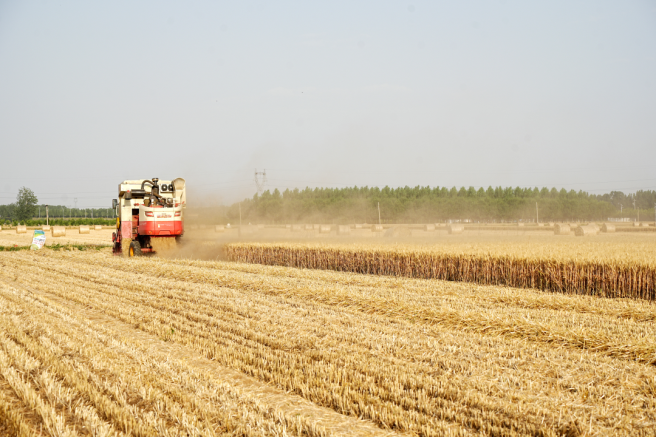On June 17th, the Seed Management Station of Cangzhou City in Hebei Province pooled experts to conduct a field evaluation and acceptance of the “Pinyu 8012” wheat variety cultivated on 200 mu of saline-alkali land. The yield reached 637.7 kilograms per mu, far surpassing the local average yield of 240 kilograms per mu for dryland alkali-resistant wheat. This achievement represents a significant increase in wheat production on saline-alkali land in Hebei Province. The “Pinyu 8012” planted on this land is a water-saving and high-yielding variety introduced by China Seeds, with cultivation management plans and full technical support provided by Syngenta Group China MAP.
The field for this evaluation and acceptance is located at Yuchun Grain Plantation Family Farm in Wumaying Town, Nanpi County, Cangzhou City. The soil in the field has a pH value of 8.32, indicating typical alkaline characteristics, and it has low organic matter and total nitrogen content. The high yield fully verifies the salt-alkali tolerance of “Pinyu 8012” and its potential for increasing yields on saline-alkali land. In addition, this variety is characterized by water-saving features, multiple resistances, heat tolerance, cold tolerance, and robust development. In 2022, the promotion of “Pinyu 8012” covered approximately 20,000 mu in Cangzhou City, Hebei Province, and it will be expanded to 60,000 mu this year.
“Pinyu 8012” is a typical demonstration of Syngenta Group China’s approach of combining “good seeds” with “good practices” to achieve increased and high yields. The MAP cultivation management plan provides strong support for unlocking yield potential and improving quality. Before sowing wheat, MAP uses seed coating agents to ensure uniform and vigorous seedling emergence. During the wintering period, when there is a significant temperature drop in the Hebei region, resulting in severe frost damage to many wheat fields, MAP develops a “post-winter weeding + regreening nutrition and crop protection” plan to ensure the safe passage of wheat through low-temperature threats. During the heading and grain filling period, frequent rainfall and rising temperatures occur in the Hebei region. The MAP technical team utilizes the “MAP Smart Agriculture” App to predict wheat diseases and implement grain filling nutrition plans. This approach has effectively controlled common diseases such as powdery mildew, stripe rust, and Fusarium head blight in the field, while extending the duration of flag leaf photosynthesis, promoting full grain filling, and improving wheat yield and quality.
